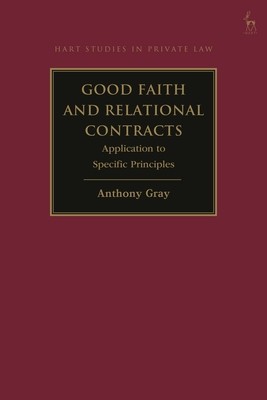
- We will send in 10–14 business days.
- Author: Anthony Gray
- Publisher: Hart Publishing
- ISBN-10: 1509980997
- ISBN-13: 9781509980994
- Format: 15.6 x 23.4 x 1.6 cm, kieti viršeliai
- Language: English
- SAVE -10% with code: EXTRA
Reviews
Description
This volume explores in detail the use of the doctrine of good faith in the common law when interpreting contracts and resolving disputes.
Building on the findings of Volume I, the book discusses the implications of relational contract theory and good faith for issues such as liquidated damages clauses, discretion to terminate a contract, contract forfeiture, employment contracts, and contractual remedies. The author discusses the potential for good faith to unite a number of currently disparate contract law and equitable principles into a coherent framework, providing an opportunity to question and jettison some archaic aspects of existing doctrine that are no longer defensible. Ambitious and thoughtful, this is a significant statement on the role of good faith in private law.EXTRA 10 % discount with code: EXTRA
The promotion ends in 23d.08:52:09
The discount code is valid when purchasing from 10 €. Discounts do not stack.
- Author: Anthony Gray
- Publisher: Hart Publishing
- ISBN-10: 1509980997
- ISBN-13: 9781509980994
- Format: 15.6 x 23.4 x 1.6 cm, kieti viršeliai
- Language: English English
This volume explores in detail the use of the doctrine of good faith in the common law when interpreting contracts and resolving disputes.
Building on the findings of Volume I, the book discusses the implications of relational contract theory and good faith for issues such as liquidated damages clauses, discretion to terminate a contract, contract forfeiture, employment contracts, and contractual remedies. The author discusses the potential for good faith to unite a number of currently disparate contract law and equitable principles into a coherent framework, providing an opportunity to question and jettison some archaic aspects of existing doctrine that are no longer defensible. Ambitious and thoughtful, this is a significant statement on the role of good faith in private law.

Reviews